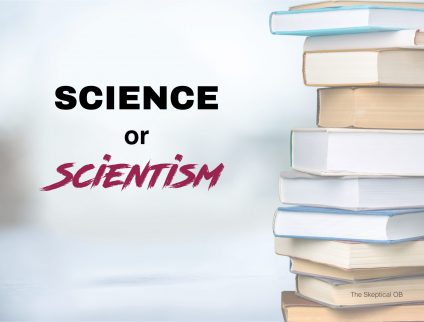
I’ve been writing for years about the way that science has been misused to support ideological movements like natural childbirth, lactivism and attachment parenting.
I’ve been writing most recently about the way that science is being misused to support ideological movements like gentle parenting and neuroparenting.
Both are scientism, not science.
What’s the difference?
Science follows the evidence wherever it leads. Scientism invokes science to cloak an ideological agenda.
Simply put, though midwives, lactation professionals and attachment parenting theorists insist that their recommendations are based on science, they use science to cloak an ideological agenda.
That’s why their predictions have never come to pass. There is no evidence that unmedicated vaginal birth is safer, healthier or better than childbirth with interventions. There is no evidence that increased breastfeeding rates saves lives, reduce major illness or limit healthcare costs in industrialized countries. There is no evidence that attachment parenting improves mental health outcomes for children.
Simply put, though parenting “experts” who prescribe specific forms of discipline or methods of “brain building” in infants and small children insist their recommendations are based on science, they use science to cloak an ideological agenda.
That’s why their predictions also aren’t coming to pass. There is no evidence that children raised with gentle parenting are mentally healthier than those raised with other philosophies. There is no evidence that neuroparenting, meant to create teens and adults who are smarter, happier and better adjusted, has done anything of the kind.
How can we tell the difference between parenting science and parenting scientism?
1. Science is falsifiable; scientism is not.
Science could (and actually does) show that breastfeeding is NOT best for a substantial proportion of babies and mothers. Scientism starts with the conclusion that breast is best, accepts any evidence to support that claim — regardless of poor quality — and rejects any evidence to the contrary.
In the case of gentle parenting, there is NO evidence that it is best. It’s proponents start with their preferred conclusion (which reflects personal beliefs about parenting), search for evidence — regardless of poor quality — to support it and reject any evidence to the contrary.
2. Scientism feels free to reject the evidence of science when it contradicts personal beliefs.
So, for example, some lactivists feel free to utterly ignore the scientific evidence on the deadly practice of bed sharing. They are not guided by science; they merely invoke science when it suits them.
So, for example, some advocates of gentle parenting feel free to utterly ignore the scientific evidence on the harms of divorce. They offer lots of excuses but the bottom line is that they are willing to ignore science when it interferes with their personal choices.
3. Science — in the best cases — has no agenda. Scientism is concealing an agenda.
Although Dr. Bill Sears claims that attachment parenting is based on the science of bonding, that’s simply an effort to hide his fundamentalist religious agenda.
Although advocates of gentle parenting claim it is based on the science of psychology, that simply an effort to cloak the anti-authoritarian political impulses that drive it.
4. Scientism attempts to use science to make claims that are utterly beyond its appropriate scope.
Science can never tell us what is “best” for even a single child let alone all children.
Consider vaccination. Science can never — and would never — claim that vaccination is best for a specific child, let alone all children. Science merely tells us what proportion of vaccinated children will acquire immunity, what proportion will have side effects and even what proportion might be allergic and therefore harmed by a specific vaccine.
Scientism doesn’t deal in proportions; it simply makes declarations like “breast is best” or “screen time is harmful.”
What does science — as opposed to scientism — really tell us about parenting? Not much. There is no single recipe for raising happy, healthy children; there are many ways to do it in keeping with the myriad different personalities of children and the multiplicity of ideological beliefs of parents.

